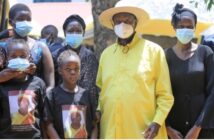Legislators have tasked government to increase efforts to end Female Genital Mutilation, warning that the practice will persist, if not addressed.
The MPs called on government to put emphasis on setting up a special fund for women involved in the practice as a way of having them leave it, fast track strategies to address FGM across borders as well as involve men in the fight, and promote girl child education.
The call follows a recent visit by lawmakers to Sebei and Karamoja regions where they discovered that the vice is on the increase despite strategies put in place to curb it.
Meeting the State Minister for Gender, Hon Peace Mutuuzo on 07 August 2019, MPs on the committees of Equal Opportunities and Education and Sports identified absence of alternative sources of livelihoods for those engaged in the practice as one of the challenges that need to be addressed.
Hon. Albert Lokoru, (NRM, Tepeth County) said that since the approach of sensitisation has not yielded good results, there is need to change strategy.
“Recently, we met women who carry out the practice and they handed over their tools but asked what they could do as an alternative source of livelihood. These women need income generating activities,” said Lokoru.
Hon. William Nokrach, (PWD, Northern ) argued that the fund will persuade the women to abandon the practice, since they currently view it as a source of livelihood.
“The existing government programmes do not target women practicing FGM, moreover some of those government programmes are not effective,” said Nokrach.
Hon. Alex Burundo (NRM, Bulambuli County) warned that FGM will not end if government does not put in place measures stopping girls from crossing into Kenya.
“Even if we stop the practice in Uganda and it is still practiced in Kenya, we shall be doing nothing. I am reliably informed that the Kenyan government is happy to take our girls,” Burundo said.
Hon. Jovah Kamateeka (NRM, Mitooma district) advised government to include men in campaigns against the practice, if success is to be registered.
“We have all come to learn that to succeed in gender parity, men have to get involved. I don’t know why men are not involved in the campaign against FGM,” said Kamateeka.
The Chairperson of Equal Opportunities Committee, Hon Hellen Asamo called for increased empowerment of women saying that women are still afraid of talking against FGM.
“Even some female MPs from Sebei and Karamoja fear to talk against the practice and they ask some of us to speak on their behalf,” said Asamo.
Bulisa district Woman MP, Hon Norah Bigirwa said that emphasis should be put on demystifying the cultural values attached to FGM.
“We need to put an end to the cultural aspect which views those not mutilated as less of women. This means involving cultural leaders and elders in this fight,” said Bigirwa.
The Minister attributed the increase in the practice to a break down in infrastructure during the rainy seasons.
“This has made it easy to migrate to Kenya because the law enforcement is low in Kenya,” said Mutuzo.
She said that the Ministry participated in the development of the East African Region Action Plan for addressing FGM across borders. She added that the Action plan was domesticated at national level with all stakeholders.
To address the issue of alternative sources of livelihoods for the women engaged in the practice, the minister said that women are encouraged to tap into the existing government programmes including the Youth Livelihood Programme, Social Assistance Grant for Elderly Persons and Operation Wealth Creation.
“We are skeptical about tailoring a programme for those engaged in the practice because it would seem like we are encouraging them to continue with the vice,” said Mutuzo.
FGM was outlawed in Uganda after the enactment of the Female Genital Mutilation Act and since then, reports indicate that the practice has reduced.
Those Who Genetically Mutilate Women Should Not Enjoy Sex-Min.Mutuuzo
Share



